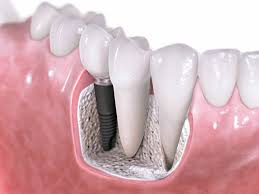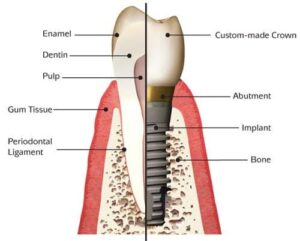
19 Apr How Long Do Dental Implants Take to Heal?
Dental implant healing duration varies from a few weeks to several months. Key elements impacting this include overall health and bone density at the implant site. Certain nuances, such as the quality of oral hygiene practised, the patient’s commitment to post-operative care, and lifestyle patterns, could unexpectedly extend or reduce the healing phase.
Factors Affecting Healing Duration
Several factors influence the healing process after getting dental implants. The following factors significantly influence the time the implants take to heal and integrate with the jawbone.
Patient’s Overall Health
A patient’s overall health determines how quickly the body can regenerate bone tissue and repair itself. Conditions such as diabetes affect the body’s ability to heal and can potentially slow down the healing process for dental implants. Conversely, patients with good physical health and a balanced diet tend to experience faster healing.
Bone Density at the Implant Site
Bone density plays a crucial role in maintaining the stability of dental implants. If a patient has low bone density at the implant site, it may prolong the healing process as the implant needs to fuse with the bone tissue for a stable foundation for the prosthetic tooth.
Oral Hygiene and Post-operative Care
Proper oral hygiene post-surgery is essential for preventing infections that could disrupt the healing process. Patients who adhere to their dentist’s post-operative care guidelines and maintain optimal oral hygiene protocols will likely experience faster and smoother healing.
Lifestyle Habits
Certain lifestyle habits can significantly impact healing after a dental implant procedure. For example, individuals who smoke may experience delayed healing due to reduced blood flow and oxygen supply to the surgical site, which are essential for proper tissue regeneration. Research shows that smoking can increase the risk of complications and failure of dental implant procedures.
Adherence to Post-Operative Care Instructions
Following post-operative care instructions diligently is critical for ensuring successful healing and integration of dental implants. Patients must adhere to prescribed medications, dietary recommendations, and restrictions on physical activities during the initial healing phase as per their dentist’s guidance. Patient education regarding post-operative care instructions is vital. It empowers individuals to actively participate in their own recovery process and contributes to optimal clinical outcomes.
In essence, these factors collectively influence the healing duration and play a critical role in determining the long-term success and functionality of dental implants. Understanding these influences allows patients to actively optimise their healing process and achieve favourable outcomes following implant surgery. Understanding what goes into fostering successful healing sets the stage for exploring specific phases involved in this comprehensive journey toward sound recovery.
Unveiling Phases of Implant Healing
The journey of dental implant healing is an intricate procedure that unfolds in several distinct phases. Understanding these phases can provide invaluable insight into what to expect during your implant treatment and shed light on the importance of each stage.
Osseointegration Phase
The initial phase, 3 to 6 months, involves a remarkable biological process called osseointegration. This phase marks the pivotal moment when the implant begins fusing with the jawbone. Imagine this as the foundation being securely laid for a house. A strong foundation ensures stability and support for a structure—osseointegration establishes a robust bond between the implant and the bone. This essential fusion provides the necessary stability for the prosthetic tooth. Throughout this time, your body accepts the implant as part of itself through a seamless integration process.
During these months, your body’s acceptance of the implant sets the stage for all future advancements in restorative dentistry. The abutment, which enables attachment of the crown or bridge, relies on this strong, stable connection. It’s akin to ensuring a bridge has a sturdy foundation before building upon it.

Abutment Placement
Once the osseointegration period draws close, it’s time for another essential step in the healing process—abutment placement. This involves attaching an abutment to the implant, creating space for the final crown or bridge. Imagine this as adding support beams to fortify that initial foundation laid during osseointegration. After abutment placement, your gums need time to heal around it, typically requiring about two weeks. During these weeks of healing around the abutment, your body ensures everything is in place and ready to receive the final tooth or bridge. Nature’s delicate balance prepares every aspect of your oral cavity for its new addition—that perfect, customised prosthetic tooth. Understanding these phases better equips you to appreciate and anticipate each step in your implant journey.

Insight into Post-Surgery Recovery
You’ve had implant surgery and are now recovering. What can you expect during this phase?
Recovery Period
In the first few days following your dental implant surgery, it’s normal to experience some mild discomfort, swelling, and bruising. This is the body’s natural response to the surgical procedure and should subside within a few days. During this time, taking any prescribed medication as directed by your dental professional to manage pain and reduce inflammation is advisable. The recovery period varies from person to person, but most patients generally feel much better after the first week. Minor bleeding or oozing from the surgical site is common and should lessen over time; however, if you notice anything unusual, it’s best to contact your dental professional for guidance.
Post-Operative Care
To ensure optimal healing and success of your dental implant, avoid strenuous activities for at least a week following surgery. This means giving yourself time to rest and heal properly. Intense physical activities can disrupt the healing process and lead to complications. Additionally, maintaining proper oral hygiene practices is vital during the recovery period. Your dental professional will provide specific instructions on how to care for your mouth after the implant surgery. It may include gentle brushing techniques around the surgical site and using a prescribed antimicrobial mouthwash or saltwater rinse to keep the area clean and free from infection. Remember, proper oral care not only aids in preventing infection but also promotes faster healing and reduces the risk of complications.
Diet Considerations
You might also need to adjust your diet during this period. It is advised to stick to softer foods that are easier to chew and won’t put pressure on the surgical site. Avoiding extremely hot or cold foods is also recommended, as these can cause discomfort. Ensure you’re getting adequate nutrition during this time, which contributes significantly to your body’s healing process.
Guide to Eating After Implant Surgery
Eating the right foods after dental implant surgery is key to ensuring proper healing and reducing the risk of complications. The goal is to facilitate healing, avoid disturbing the surgical site, and prevent damage to the implants. During the initial phase of recovery, it’s important to stick to a soft diet to minimise discomfort and promote successful healing. Soft foods like yogurt, smoothies, pureed vegetables, scrambled eggs, and mashed potatoes are excellent choices during the first few days or weeks after surgery. These foods require minimal chewing and are gentle on the surgical site. They also provide essential nutrients that aid in the healing process. Consider incorporating protein-rich foods like pureed meats or lentils, as they can promote tissue repair.
It’s best to avoid hot, spicy, or acidic foods as they can irritate the surgical area. Instead, focus on consuming lukewarm or cold foods to soothe any discomfort. Also, using a straw for drinking liquids can help bypass potential irritation caused by contact with the surgical site. As time passes and your dentist confirms that healing is progressing well, you can gradually reintroduce firmer foods into your diet. Good options for this stage are cooked vegetables, pasta, fish, and soft fruits like bananas or avocados. When preparing these meals, ensure they are thoroughly cooked or softened to make them easier to chew.
Throughout the recovery period, avoiding hard, crunchy, or sticky foods that may exert pressure on the implants or cause irritation to the incision site is crucial. Nuts, seeds, hard candies, popcorn, tough meats, and sticky candies should be avoided until your dentist gives you the go-ahead to reintroduce them into your diet. Your diet is vital in supporting your body’s natural healing after dental implant surgery. Following these dietary guidelines and prioritising gentle, nutritious options can contribute to successful recovery and optimal oral health outcomes in the long run.
Tips for Long-Term Implant Health Maintenance
Maintaining the health of your dental implants is crucial for their long-term success. The goal of getting dental implants is to restore your smile and oral function for years to come, so taking care of them should be a top priority. Let’s explore some valuable tips to help you maintain the health and longevity of your dental implants.
1. Make Oral Hygiene a Priority
Regular brushing and flossing are fundamental practices for maintaining the health of your natural teeth and equally vital for your dental implants. Use a soft-bristle toothbrush and non-abrasive toothpaste to gently clean your implant-supported teeth twice a day. Flossing once daily helps remove plaque from areas that brushing can’t reach, promoting healthy gums and preventing gum disease. During cleaning, it’s essential to pay extra attention to the areas around the implant crowns or prostheses. Over time, plaque and tartar can accumulate on and around the implant abutments, leading to infection and bone loss.
2. Attend Routine Dental Check-Ups
Regular visits to your dentist are an integral part of implant maintenance. Dental professionals will evaluate the condition of your implants, perform comprehensive cleanings, and check for any signs of potential issues like peri-implantitis (inflammation around the implant). These routine check-ups provide an opportunity to identify and address any concerns early, ensuring your implants’ long-term success. Moreover, professional cleanings performed by dental hygienists can effectively remove hardened plaque (calculus) in areas that may be challenging to reach with regular brushing and flossing alone.
3. Healthy Lifestyle Habits
Adopting overall healthy lifestyle habits significantly contributes to the success of your dental implants. Avoid smoking or using tobacco products, as these substances can impair healing after implant placement and increase the risk of implant failure. Nicotine restricts blood flow, slowing down the body’s natural healing processes. Similarly, excessive alcohol consumption can impact bone density and weaken the immune system, potentially affecting bone integration with the implant.
4. Protect Your Implants
If you engage in activities with a risk of facial trauma, such as contact sports or activities where falling is common, consider wearing protective gear or using mouthguards to shield your face and prevent potential damage to your dental implants. For individuals who grind or clench their teeth (bruxism), addressing this issue through night guards or other therapeutic interventions becomes crucial to safeguard both natural teeth and dental implants from excessive force and wear.
By incorporating these practical guidelines into your daily routine and lifestyle choices, you’re setting yourself up for the successful long-term maintenance of your dental implants. It’s about prioritising good oral health practises, and mindful habits that preserve the beauty and functionality dental implants offer you daily. You now have the essential knowledge for maintaining optimal oral health with your dental implants.
If you previously had dental implants but are experiencing problems with your healing, give us a call at Kirrawee Dental Practice at (02) 8544 8607. We would be happy to schedule you with one of our dental implant experts.


